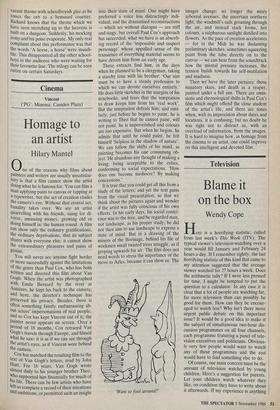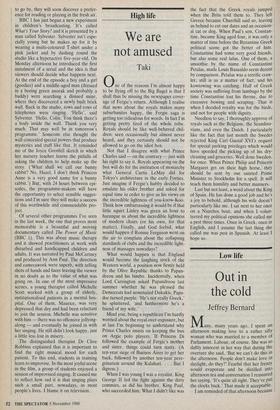Television
Blame it on the box
Wendy Cope
ere is a horrifying statistic, culled from last week's This Week (ITV). The typical viewer's television-watching over a year would fill January and February 24 hours a day. If I remember rightly, the last horrifying statistic of this kind that came to my attention suggested that the average viewer watched for 27 hours a week. Does the arithmetic tally? If I were less pressed for time, I might be tempted to put the question to a calculator. In any case it is clear that a lot of people are watching far, far more television than can possibly be good for them. How can they be encour- aged to watch less? Why isn't there more urgent public debate on this important issue? It would be a good idea to make it the subject of simultaneous two-hour dis- cussion programmes on all four channels, each programme featuring a panel of tele- vision executives and politicians. Obvious- ly very few people would want to watch any of these programmes and the rest would have to find something else to do.
Of course, our main concern must be the amount of television watched by young children. Here's a suggestion for parents. Let your children watch whatever they like, on condition they have to write about it afterwards. If my experience is anything to go by, they will soon discover a prefer- ence for reading or playing in the fresh air.
BBC 1 has just begun a new experiment in children's broadcasting. It's called What's Your Story? and it is presented by a man called Sylvester. Sylvester isn't espe- cially young but he makes up for it by wearing a multi-coloured T-shirt under a pink jacket and by dashing round the studio like a hyperactive five-year-old. On Monday afternoon he introduced the first instalment of a serial and the idea is that viewers should decide what happens next. At the end of the episode a boy and a girl (goodies) and a middle-aged man (dressed in a boring green anorak and probably a baddy) were searching a disused mine, where they discovered a newly built brick wall. Back in the studio, rows and rows of telephones were ringing. 'Hello', said Sylvester. 'Hello, Colin. You think there'S a body inside the wall. Thank you very much. That may well be in tomorrow's programme.' Someone else thought the wall concealed special powers that produce mysteries and stuff like that. It reminded me of the Joyce Grenfell sketch in which her nursery teacher learns the pitfalls of asking the children to help make up the story. ('What shall we call our bunny rabbit? No, Hazel, I don't think Princess Anne is a very good name for a bunny rabbit.') But, with 24 hours between epi- sodes, the programme-makers will have the opportunity to select sensible sugges- tions and I'm sure they will make a success
of this worthwhile and commendable pro- . ject.
Of several other programmes I've seen in the last week, the one that proves most memorable is a beautiful and moving documentary called The Power of Music (BBC 1). This was about music therapy and it showed practitioners at work with disturbed and handicapped children and adults. It was narrated by Paul McCartney and produced by Ann Paul. The direction and camerawork were superb, with telling shots of hands and faces leaving the viewer in no doubt as to the value of what was going on. In one of the most impressive scenes, a young therapist called Michelle Scott worked with a group of elderly, institutionalised patients in a mental hos- pital. One of them, Maurice, was very depressed that day and had been reluctant to join the session. Michelle was sensitive with him — there was no offensive jollying- along — and eventually he joined in with her singing. He still didn't look happy, just a little less lost in misery.
The distinguished therapist Dr Clive Robbins explained that it is important to find the right musical mood for each patient. To this end, students in training learn to improvise. In the most joyful scene in the film, a group of students enjoyed a session of improvised singing. It caused me to reflect how sad it is that singing plays such a small part, nowadays, in most people's lives. I blame it on television.



































































 Previous page
Previous page